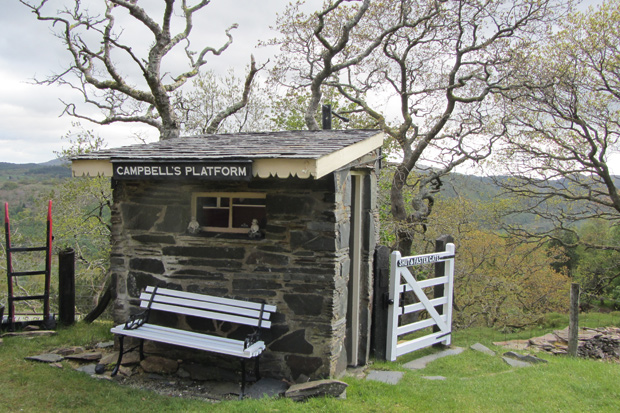In 1964, as part of his railway cuts, Dr Beeching ordered the closure of Duncraig, a small, little-used station in the Scottish Highlands. The train drivers working the line simply ignored him. They continued to stop there, and the station remains open to this day.
A world where nothing ever changes, or indeed happens — this is just the sort of world that appeals to Dixe Wills. His latest travelogue takes in 38 of the 150 or so remaining ‘request’ stops on Britain’s railway network. I didn’t know such things existed at all, but apparently there they are (including Duncraig), only seeing action as and when a passenger informs the guard accordingly. Look at a timetable and you’ll see they’re denoted by an ‘x’ — for example, ‘13×04’ rather than ‘1304’.
The thing about nothing ever happening, at least when it comes to books, is that it puts you totally in the hands of the author. Whether or not you like this tale will depend on whether you like the way Wills describes the nothing that happens as he travels around the network. By his own admission there’s precious little to examine at the stations themselves, so you’ll need to share his sense of humour as he explores the surrounding areas, and his fascination with the minutiae of modern British life.
Its place names, for instance — Bugle, Spital, Greensplat, Trumpet — as well as its people. The woman who appeals to a guard for help on a low platform: ‘You’ll have to give me a bunk-up.’ The two young lads who talk in Welsh but swear in English. The parting couple who kiss opposite sides of the same train window. In a Norfolk pub Wills encounters a silence that is ‘like an extra character in the room, an unseen and resentful host’. An abandoned quay in Cornwall juts out ‘like the floor-pressed snout of a sad dog that has been told off and can’t fathom out why’. The quietness of a lorry’s engine as the driver changes gear is ‘like the pause when a child draws breath between sobs’.
The nothing that happens doesn’t just allow Wills’s feet to roam — it does the same for his mind. So we learn that a univocal poem is one that excludes four of the five vowels (Wills writes a very good ‘o’-centric one about Conwy), and that the international section of the Guatemalan telephone directory misspells Blackburn as ‘Blackbum’.
History is well-covered, too, from the Welsh tsunami of 1927 to the 1972 influx of Ugandan Asian refugees, whose train had to ‘stop and shuffle along four times [at Tonfanau station] in order that all the passengers could get out onto the short platform’. An Italianate water tower in Grimsby was deliberately missed by Luftwaffe bombers during the second world war because it gave them something to navigate by, with the result that the British considered knocking it down themselves (thankfully they refrained). The Special Operations Executive, meanwhile, invented the string vest.
Train fans will probably get more from this book than non-train fans. Though surely all of us can appreciate the poignancy of the story told by Wills about Albert Camus. Having once said that the most absurd way to die would be in a car crash, the philosopher died in a car crash. What’s more, he had had to be persuaded to make the journey that way by the car’s driver — an unused train ticket was found in Camus’s pocket.
Got something to add? Join the discussion and comment below.
Get 10 issues for just $10
Subscribe to The Spectator Australia today for the next 10 magazine issues, plus full online access, for just $10.
Available from the Spectator Bookshop, £13.99. Tel: 08430 600033
You might disagree with half of it, but you’ll enjoy reading all of it. Try your first month for free, then just $2 a week for the remainder of your first year.













Comments
Don't miss out
Join the conversation with other Spectator Australia readers. Subscribe to leave a comment.
SUBSCRIBEAlready a subscriber? Log in